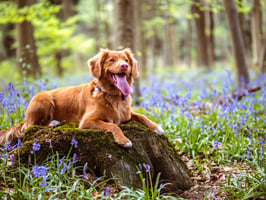Training a puppy is an essential part of raising a happy and healthy canine companion. Knowing how...
What to do if your Dog is Not House Trained at 1 Year?
House training a puppy can be a difficult task, but it is an important part of having a well-behaved and happy pup. Unfortunately, sometimes puppies don't get the hang of house training when they are young and, as a result, are not house trained at the age of one. If your pup is not house trained at one year, there are a few steps you can take to help them get the hang of it.
Understand the Reasons for Puppy’s House Training Issues
Before you can effectively house train your dog, it is important to understand why they are having difficulty with the process. Some common reasons why puppies may not be house trained at one year include:
- Inconsistent Training: If you are not consistent with your house training efforts, your pup may not learn what is expected of them.
- Not Enough Opportunities: If your pup does not have enough opportunities to go outside, they may not learn to go outside when they need to go.
- Lack of Rewards: If your pup is not rewarded for going outside when they should, they may not understand that this is the desired behaviour.
By understanding why your pup is having difficulty with house training, you can more effectively address the issue and help your pup learn the desired behaviour.
Create an Effective House Training Plan
Once you understand the reasons why your pup is not house trained, you can create an effective house training plan. This plan should include:
- Consistent Training: Make sure you are consistent with your house training efforts. This includes taking your pup outside at the same time each day and rewarding them for going outside when they should.
- Regular Opportunities: Give your pup plenty of opportunities to go outside. This means taking them out regularly throughout the day and night.
- Positive Reinforcement: Make sure you reward your pup for going outside when they should. This will help them understand that this is the desired behaviour.
By creating an effective house training plan, you can help your pup learn the desired behaviour and become house trained.
Be Patient with Your Dog
When you are house training your pup, it is important to be patient with them. House training can be a difficult process and it may take some time for your pup to get the hang of it. Be patient with your pup and don't get frustrated if they make mistakes. With patience and consistency, your pup will eventually learn the desired behaviour.
Seek Professional Help
If your pup is having difficulty with house training, it may be a good idea to seek professional help. A professional trainer can help you create an effective house training plan and provide tips and advice on how to house train your pup. They can also help you identify any underlying issues that may be contributing to your pup's house training issues.
Conclusion
House training can be a difficult process, but it is an important part of having a well-behaved and happy pup. If your pup is not house trained at one year, there are a few steps you can take to help them get the hang of it. Make sure you understand the reasons why your pup is having difficulty with house training, create an effective house training plan, be patient with your pup, and seek professional help if necessary. With patience and consistency, your pup will eventually learn the desired behaviour and become house trained.



